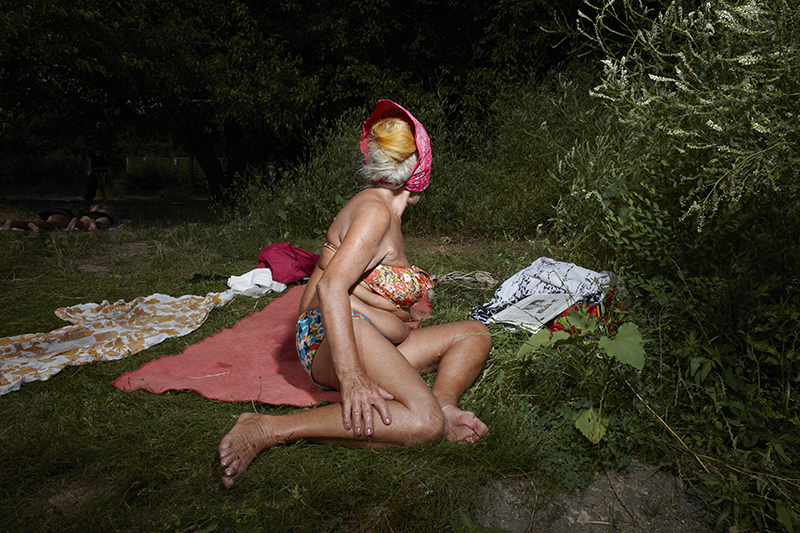
Bather #5, from series Bathers, UKR/IZOLYATSIA 2011 © Richard Ansett. Acquired by Bibliothèque Nationale de France (BnF), 2013 / Winner- Grand Prix de la Decouverte 2013
Facuity is the awareness of the facticity of an object or event – an awareness of that which is beyond awareness.
Origins;
Facticity –that which resists explanation and interpretation. Facticity is something that already informs and has been taken up in existence, even if it is unnoticed or left unattended. As such; facticity is not something we come across and directly behold.
Acuity –the state of being aware, sensitive to.
The very nature of facuity is consciousness of the multiple frames of reference that exist simultaneously. It is the realisation, in the present, of all forces within but most importantly, those beyond awareness irrespective of our understanding of them.
In photographic terms, the content within the frame can be explored as documentation or clear narrative but it is a photograph’s relationship to the external forces, that which is beyond the frame as well as the presence of literal, philosophical, emotional and most importantly unknown elements that is the immediate’s facuity. The facticity of an object is the context of its existence regardless of any awareness of it; the facuity is the ‘awareness’ of all possibilities. For example: If we consider we are imprisoned within a certain frame of reference, we are immediately incongruent with that reality and unable to objectify the meaning of any event that occurs within it. A continual awareness and exploration of one’s incongruence is an observer’s facuity.
An object or event can be viewed through an earthly frame of reference (up and horizontal plain). http://archive.org/details/frames_of_reference. Awareness of one or more alternative frames of reference may entirely alter the meaning of the same action; this challenges the notion of any concept of a shared universality of human existence. The reality of an action is altered by an acknowledgement of its facticity. Recognition of a lack of consciousness of all the frames of reference opens an event up to multiple interpretations in the same moment.
For example: emotions are not entirely relative to a conscious frame of reference in the same way that actions or objects are. An emotional experience may seem to be shared in a tangible way through the rules of a societal frame of reference but any individual response is entirely unique but masked. An emotion is not equal to the concepts of competition and ownership but it has been corrupted in a capitalistic context and the emotional experience has been named and therefore commodified. The artist working with photography can reclaim this space through the representation of emotion as ambivalent and presenting it in the same medium that is most responsible for its corruption. To manage this form of emotional competition, we have withdrawn into personal universes from where our emotions seem more comprehendible and personally ‘valuable’ but we are unable to recognise complexity of emotion outside of the range that can be defined as commercially valuable in others – commodification encourages individualism,
But what appears as ‘normal’ may in fact be an equivalent observation from within the same frame of reference; for example, one observing oneself. An alternative observation from an external position may appear different (although still entirely arbitrary).
This may seem obvious but perhaps only by exploring and presenting the complexity of this individual universe through an acceptance that understanding is relative (and therefore impossible) can a new form of societal empathy be realised. Accepting that we may not existentially understand, frees us to explore more complex reality and empathise better with each other and our surroundings. For example, the hubris of seeing the world through the lens of the human experience. Coal as a fuel, or a flower that is beautiful.
Photography can be the antithesis of its stereotype – in the hands of an artist it can be an instrument through which we disavow certainty and invite a truly open exploration of reality through a medium that captures a two dimensional facsimile of reality.
References;
http://en.wikipedia.org/wiki/Facticity
http://www.merriam-webster.com/dictionary/frontality
http://www.youtube.com/watch?v=hm5MYY_sFiU
http://staceypelinka.blogspot.co.uk/2009/07/stepping-outside-your-frame-of.html
http://dictionary.reference.com/browse/frame+of+reference
http://www.merriam-webster.com/dictionary/frame%20of%20reference
http://en.wikipedia.org/wiki/Eternalism_(philosophy_of_time)
http://www.thefreedictionary.com/equivalent